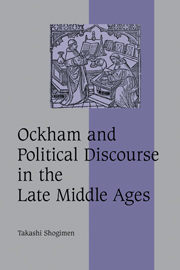Book contents
- Frontmatter
- Contents
- Preface
- List of abbreviations
- INTRODUCTION
- 1 THE POVERTY CONTROVERSY
- 2 A GENERAL THEORY OF HERESY
- 3 THE PROBLEM OF PAPAL HERESY
- 4 PAPAL PLENITUDO POTESTATIS
- 5 PETRINE PRIMACY
- 6 THE DEFENCE OF HUMAN FREEDOM
- Appendix: Ockham's ‘Dialogus’ and Marsilius' ‘Defensor pacis’
- Bibliography
- Index
- Cambridge Studies in Medieval Life and Thought Fourth series
2 - A GENERAL THEORY OF HERESY
Published online by Cambridge University Press: 23 July 2009
- Frontmatter
- Contents
- Preface
- List of abbreviations
- INTRODUCTION
- 1 THE POVERTY CONTROVERSY
- 2 A GENERAL THEORY OF HERESY
- 3 THE PROBLEM OF PAPAL HERESY
- 4 PAPAL PLENITUDO POTESTATIS
- 5 PETRINE PRIMACY
- 6 THE DEFENCE OF HUMAN FREEDOM
- Appendix: Ockham's ‘Dialogus’ and Marsilius' ‘Defensor pacis’
- Bibliography
- Index
- Cambridge Studies in Medieval Life and Thought Fourth series
Summary
against the errors of this pseudo-pope ‘I have set my face like the hard rock’, so that neither lies nor slurs nor persecution of whatever sort (that does not physically touch my person), nor the multitude, however great, of those who believe or favour or even defend him will ever at any time be able to prevent me from attacking and refuting his errors as long as I have hand, pen, parchment, and ink.
In demonstrating that the bull Quia vir reprobus was full of heretical errors, Ockham identified himself as a theologian who was determined to combat papal heresy. The problem of papal heresy, which had perplexed canonists and theologians alike, inevitably raised for Ockham a number of ecclesiological questions. Is it possible for a pope – the vicar of Christ and successor of St Peter – to fall into heresy? If it is, who can judge a pope and how? What sanction should be applied to a heretical pope? Ockham did not fail to discern these – to mention only three – crucial, if not novel, issues. During the course of writing the Opus nonaginta dierum, he was probably aware of the need to embark on an investigation of these questions. By late 1334, Part I of the Dialogus, which was still more voluminous than the Opus nonaginta dierum, had been written for this purpose.
I Dialogus, as the title suggests, takes the form of a dialogue between a master and a disciple.
- Type
- Chapter
- Information
- Ockham and Political Discourse in the Late Middle Ages , pp. 75 - 104Publisher: Cambridge University PressPrint publication year: 2007

